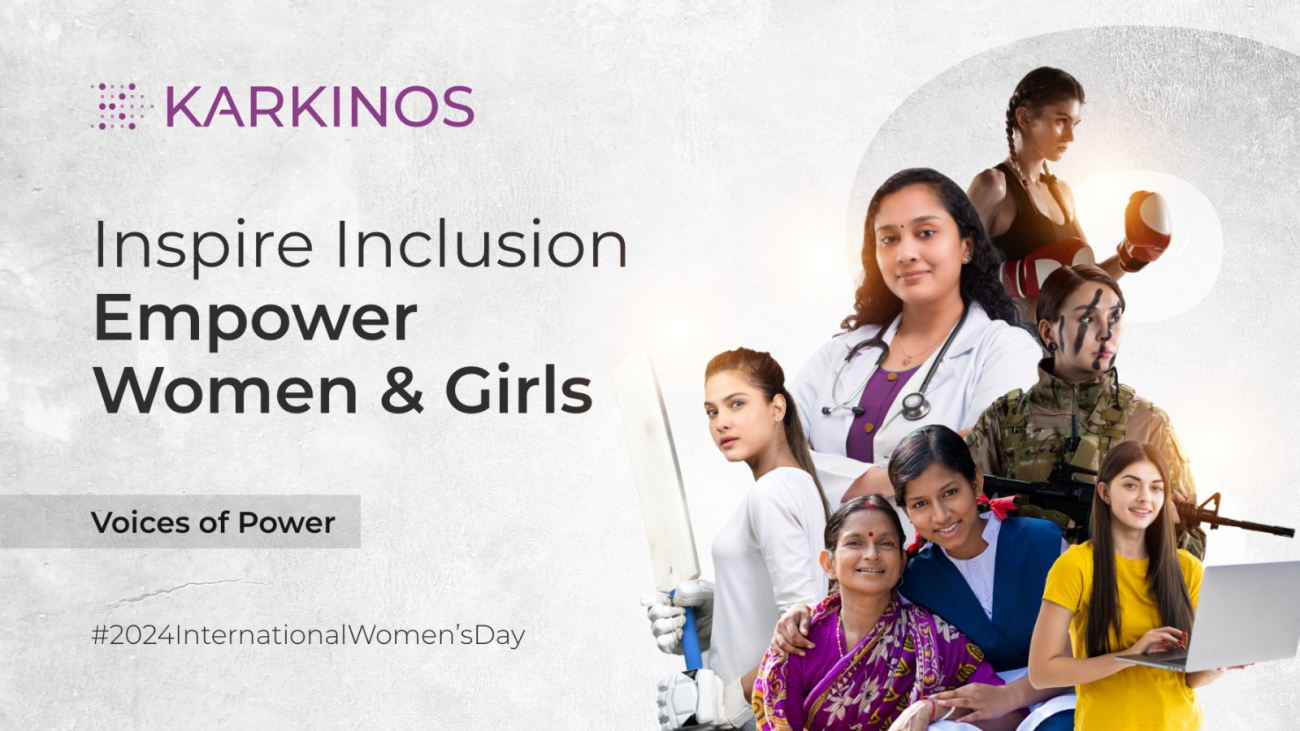Her Voice Matters!
Building a More Inclusive Cancer Care System with Women
In the spirit of International Women’s Day 2024, this blog delves into the critical role of inclusivity of women in cancer care, as seen through the eyes of our inspiring women leaders and doctors at Karkinos Healthcare. They share their diverse viewpoints on ensuring all women feel empowered and supported throughout their cancer journey or are valued as important decision makers in cancer care plans.
Explore their insights on fostering open communication, addressing potential biases, and creating a patient-centred environment where every woman’s voice is heard and thereby tangible outcomes are made possible by increasing inclusivity of women.
Capitalising intuitiveness quality in women
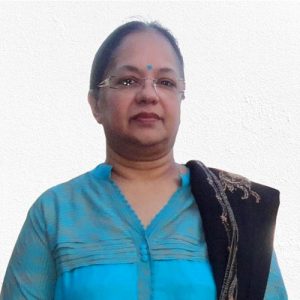 A woman dons several roles through her lifetime. She can be a daughter, a mother, a teacher, a sister, a nurse, or a counsellor. Whichever role she dons, the innate quality in her to shower selfless care and love to her near and dear ones is indomitable. Women are highly intuitive and that one quality she exhibits can bring about miracles. The intuitiveness in her allows her to take proactive decisions for her family. If she has the ability to take proactive steps in preventing a danger, then isn’t she the one to be made aware of the ways to prevent cancer.
A woman dons several roles through her lifetime. She can be a daughter, a mother, a teacher, a sister, a nurse, or a counsellor. Whichever role she dons, the innate quality in her to shower selfless care and love to her near and dear ones is indomitable. Women are highly intuitive and that one quality she exhibits can bring about miracles. The intuitiveness in her allows her to take proactive decisions for her family. If she has the ability to take proactive steps in preventing a danger, then isn’t she the one to be made aware of the ways to prevent cancer.
I am convinced that when 1 woman is educated about the causes and prevention of cancer diseases, like a ripple effect, four or many more families, including hers, will be educated. Women are the best propagators of good information.
Indian women, especially give a lot of importance to cooking and serving their families healthy food and in creating good habits. These qualities make her an important factor in the global cancer prevention efforts. Hence, increasing access to cancer screening programmes and creating an awareness about cancer risk factors to a large population of women can bring a significant reduction in the cancer incidence rates.
Since the cancer burden in India is almost 51% borne by women it is imperative that the right awareness about cancer has to be provided to women. Inspiring women in the right way can get them to be more inclusive in cancer care programmes and also empowering them with evidence-based decision-making avenues can make their voices heard.
————-Dr. Malini Chandrasekharan, Medical Director – South, Karkinos Healthcare
Inclusiveness and equity for women across the cancer care continuum
 Women impact cancer care in complex ways, as healthy individuals participating in cancer prevention and screening activities, as individuals living with and beyond a cancer diagnosis, as caregivers for family members and friends, as patient advocates, as health workers and healthcare professionals, and as cancer researchers and policy makers. Women have the remarkable ability to embody an array of roles that span across different spheres of life. However, even in modern society, women experience gender bias, and are subject to overlapping forms of discrimination, rendering them structurally marginalised. Several associated factors can intersect and restrict a woman’s rights and opportunities to avoid modifiable cancer risks and impede their ability to seek and obtain a prompt diagnosis and quality cancer care.
Women impact cancer care in complex ways, as healthy individuals participating in cancer prevention and screening activities, as individuals living with and beyond a cancer diagnosis, as caregivers for family members and friends, as patient advocates, as health workers and healthcare professionals, and as cancer researchers and policy makers. Women have the remarkable ability to embody an array of roles that span across different spheres of life. However, even in modern society, women experience gender bias, and are subject to overlapping forms of discrimination, rendering them structurally marginalised. Several associated factors can intersect and restrict a woman’s rights and opportunities to avoid modifiable cancer risks and impede their ability to seek and obtain a prompt diagnosis and quality cancer care.
What goes beyond our attention is women that serve an unfairly paid cancer caregiver workforce that is predominantly female, and hinder women’s professional advancement as leaders in cancer research, practice, and policy making. There are several recommendations made to advance a more nuanced, inclusive, and gender transformative approach to the cancer field, to mention a few:
- Develop, strengthen, and enforce laws and policies that reduce exposures to known cancer risks for girls and women;
- Design and implement gender and intersectional transformative strategies to increase equitable access to early detection and diagnosis of cancer;
- Co-create accessible and responsive health systems that provide respectful, quality cancer care for girls and women;
- Integrate a gender competency framework into the education and training of the cancer workforce.
We need to listen to the unique stories that reflect the lived experiences of women from different communities and contexts, whose interactions with the cancer health system illustrate overlapping forms of discrimination that impact their personal and professional lives.
Let’s build a path forward that transforms the ways that women interact with the cancer health system, whether as patients, as care providers, or both.
————–Dr Rita Issac, Senior Consultant & Director of Population Research, Karkinos Healthcare
Women’s good health contributes to public health advancement
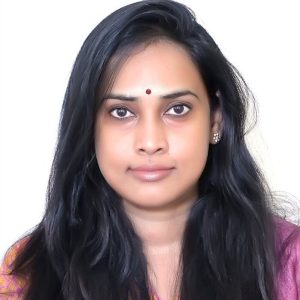 Inclusion of women in cancer screening is a multifaceted challenge that requires a concerted effort from healthcare providers, policymakers, and communities. A woman is considered the backbone of her family. Her well-being reflects onto the wellbeing of her entire family. By addressing barriers through education, financial support, community engagement, cultural competence, language access, and technological innovation, we can create a healthcare landscape where all women have equal and equitable access to life-saving cancer screening services. This inclusivity not only improves individual health outcomes but contributes to the overall advancement of public health on a global scale.
Inclusion of women in cancer screening is a multifaceted challenge that requires a concerted effort from healthcare providers, policymakers, and communities. A woman is considered the backbone of her family. Her well-being reflects onto the wellbeing of her entire family. By addressing barriers through education, financial support, community engagement, cultural competence, language access, and technological innovation, we can create a healthcare landscape where all women have equal and equitable access to life-saving cancer screening services. This inclusivity not only improves individual health outcomes but contributes to the overall advancement of public health on a global scale.
——————Dr. Sravanthi Nuthalapati, Consultant Gynecology Oncology, Women’s Wellness, Karkinos Healthcare
Women must develop ‘Me First’ attitude
 Women have always been negligent of their own health, never learning to take care of themselves first. For them, caring for family comes first. This made me call out for a slogan ‘Me First’. Women are the centre of this tiny universe called family, if she is empowered to take care of her own health, the family remains strong and healthy. With this as our mission in the women wellness program, our team shared verified information, engaged them in risk assessments and screening, which empowered them to make decisions regarding their own health.
Women have always been negligent of their own health, never learning to take care of themselves first. For them, caring for family comes first. This made me call out for a slogan ‘Me First’. Women are the centre of this tiny universe called family, if she is empowered to take care of her own health, the family remains strong and healthy. With this as our mission in the women wellness program, our team shared verified information, engaged them in risk assessments and screening, which empowered them to make decisions regarding their own health.
At all our community cancer prevention programs we see with great amazement on how negative thoughts and dilemmas in women could be transformed into a positive experience.
With adequate information, motivation and understanding, the women in the community can not only save themselves, but also incorporate their learnings in their children, eventually leading to prevention, early detection, and down-staging of cancers. This initiative has proven that women should be acknowledged and accepted as an important pillar of the community, needing to be taken care of. With women wellness, our mission is to make the invisible half, visible again.
————Dr Neetu Sinha, CINI Project, Early Detection, Karkinos Healthcare
Equal representation of women in leadership positions
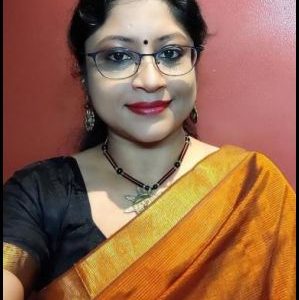 The cancer burden in women is significantly under-recognized especially in developing countries like India. Greater understanding of the causes and risk factors for cancer in women is needed as they are less well understood compared with cancer risk factors for men. Women are more likely to have fewer financial resources to cope with cancer-related financial challenges.
The cancer burden in women is significantly under-recognized especially in developing countries like India. Greater understanding of the causes and risk factors for cancer in women is needed as they are less well understood compared with cancer risk factors for men. Women are more likely to have fewer financial resources to cope with cancer-related financial challenges.
To transform the ways women interact with the cancer health system, gender to be included in all cancer-related health policies and guidelines, making the women responsive to the needs and aspirations of all women, whether they be patients or care providers.
The strategies should be targeted at increasing women’s awareness of cancer risk factors and symptoms along with increasing access to early detection and diagnosis of cancer. Through training programmes and leadership encouragement, an accessible health care system should be created to provide quality cancer care for women. Regular screening guidelines for breast and cervical cancer are to be implemented in health care policies. Equal representation of women in leadership positions is to be ensured within the cancer workforce.
—————— Dr. Sreya Mallik, Consultant Medical Oncologist, Karkinos Healthcare, West Bengal
Pledge to get our girls vaccinated
 I have screened over 10,000 citizens by collaborating with Government, NGOs, SHGs by conducting cancer early detection programmes. I had the privilege to work for Karkinos in Munnar. The citizens in Munnar, once diagnosed with cancer, had to travel several hours to avail advanced cancer treatment. We could screen several of them and diagnose cancer at an early stage and close the care gap that existed there.
I have screened over 10,000 citizens by collaborating with Government, NGOs, SHGs by conducting cancer early detection programmes. I had the privilege to work for Karkinos in Munnar. The citizens in Munnar, once diagnosed with cancer, had to travel several hours to avail advanced cancer treatment. We could screen several of them and diagnose cancer at an early stage and close the care gap that existed there.
I have always preferred to educate women about the importance of early detection of cancer. I have noticed that when educated properly, they would come forward for screening and even bring their family and relatives. Hence creating awareness in women is to create Awareness in her children, her family and even community. Women are pivotal in shaping the world around us. Prevention starts at home, be it cooking methods or bringing up children with healthy lifestyles.
In my practice, I have observed that these wonderful ladies put their family needs before their own. If they had to choose between getting themselves screened and vaccinating their children, they invariably chose to vaccinate their children.
Women play a vital role in our communities as they bring immense value to our lives. Instead of solely focusing on traditional roles, let’s celebrate this Women’s Day by ensuring they receive the support and access to healthcare, including screenings for cancer prevention, that they deserve.
On this Women’s Day I want all you beautiful ladies out there to know that Cervical cancer can be screened, detected, and prevented. Cervical cancer is caused by Human papillomavirus (HPV). Let’s vaccinate our little girls against HPV and let us all get screened for HPV. We could beat COVID, then why not HPV?
________Dr. Devu Prakash, General Practitioner, NCD, Karkinos Healthcare
Selfcare must be every woman’s goal
The lady of the house, the multi-tasker that she generally is, juggles with several responsibilities at  home and at the work-place, many a time forgets/hesitates to take time out for self-care. Meanwhile, silently but surely, the incidence of cancer cases in our country continues to increase at an alarming rate. Being a Woman Oncologist myself, I would like to take this opportunity on International Women’s Day to remind all the wonderful women out there to get regular health check-ups done for themselves, including screening for the common cancers in women (breast, cervix, oral, etc.) at the stipulated time points (of their age) and intervals, because early detection of these potentially curable cancers could save lives!
home and at the work-place, many a time forgets/hesitates to take time out for self-care. Meanwhile, silently but surely, the incidence of cancer cases in our country continues to increase at an alarming rate. Being a Woman Oncologist myself, I would like to take this opportunity on International Women’s Day to remind all the wonderful women out there to get regular health check-ups done for themselves, including screening for the common cancers in women (breast, cervix, oral, etc.) at the stipulated time points (of their age) and intervals, because early detection of these potentially curable cancers could save lives!
We also need the women in leadership positions to be the ‘Voice of Awareness’ in this regard and break the misconceptions and stigma surrounding the early detection (methods) of these common cancers, and also gently nudge their fellow women in the direction of a healthy way of living, emphasising on good lifestyle and food habits.
__________Dr. Srikamakshi Kothandaraman, Consultant Head & Neck Oncologist, Karkinos Healthcare
Empathy is the compass
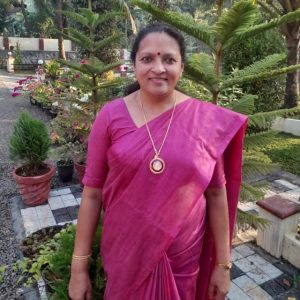 As we celebrate International Women’s Day, it is imperative to address the unique challenges women face in the realm of cancer care and advocate for inclusivity. Women’s experiences with cancer are multifaceted, influenced by biological, societal, and cultural factors. To make cancer care more inclusive for women, a holistic approach is always paramount.
As we celebrate International Women’s Day, it is imperative to address the unique challenges women face in the realm of cancer care and advocate for inclusivity. Women’s experiences with cancer are multifaceted, influenced by biological, societal, and cultural factors. To make cancer care more inclusive for women, a holistic approach is always paramount.
As a nurse, I have witnessed firsthand the gaps that exist in the realm of cancer care, particularly concerning women. In my commitment to inclusivity, I have acknowledged and addressed these voids, recognizing the unique challenges and strengths that women bring to their battle against cancer. It’s not just about administering medications; it’s about understanding the intricate dance of emotions, fears, and hopes that women navigate. The tapestry of care we weave must encompass the entirety of their experience.
In my practice, I have seen the transformative power of inclusivity – the profound impact it has on a woman’s journey after being diagnosed with cancer. I have achieved this by creating spaces where my patients feel heard, understood, and supported, thus becoming architects of a more compassionate and effective cancer care paradigm. Inclusivity, based on my experience, is not an abstract concept; it is the lifeline that connects us to the hearts and minds of those we serve.
As an oncology specialised nurse in my past experience, I not only met my cancer patients but understood their journey, adopting empathy as my compass. I consistently experienced inclusivity becoming the cornerstone of healing – a testament to the profound impact of personalised, woman-centric care. This inspiration propels me to continue my profession in the oncology unit.
So, my message to my fellow nurses is to lead the charge in making every woman diagnosed with cancer’s journey not just medically sound but deeply meaningful and reflect the essence of womanhood in every aspect of care that you provide.
________Gayathri Venugopalan Nair, Chief Nursing Officer, DCCN – Nursing, Karkinos Healthcare
Support women with informed decision making opportunities
 Women play a central role in Indian families, and their health and well-being are essential to the strength of our communities. Achieving inclusive and participatory cancer care requires raising awareness, providing encouragement, and empowering women to make informed decisions about their health.
Women play a central role in Indian families, and their health and well-being are essential to the strength of our communities. Achieving inclusive and participatory cancer care requires raising awareness, providing encouragement, and empowering women to make informed decisions about their health.
At Karkinos Healthcare, we’ve successfully achieved over 80% female participation in screening programs through educational sessions, supportive counselling, and continuous follow-up within a safe and transparent environment. Our team of #SHEroes (female heroes), clinicians, and wellness advocates leverage our proven oncology platform to empower women to take control of their health and access comprehensive care.
__________________Sripriya Rao, Co-Founder and COO, Karkinos Healthcare
Increase women participation in care plan discussions
 Caring for cancer patients is a unique journey. Caregivers form a very important part of the ecosystem but are often not paid much attention. All round care of patients requires attention besides treatment to many aspects like diet, rest, psychological well-being, and rehabilitation in work life.
Caring for cancer patients is a unique journey. Caregivers form a very important part of the ecosystem but are often not paid much attention. All round care of patients requires attention besides treatment to many aspects like diet, rest, psychological well-being, and rehabilitation in work life.
Women play a very important role as a caregiver but most of the time are excluded in the discussions with doctors or in the decision-making process of the care journey. Making them a part of the care plan discussion, addressing their viewpoints, and empowering them to be participatory caregivers can go a long way in the fight against cancer.
_______________Dr. Anjali Kulkarni, VP Clinical Informatics, Karkinos Healthcare
Improving participation in clinical trials
 When the problem is so systemic and chronic, any place is a good place to start. I would start with how clinical trials are designed. Access to clinical trials for women remains quite low, globally. Hiring right to ensure adequate women representation across the spectrum of healthcare workers from Lab Technicians to Nurses to Doctors is another crucial area to focus on.
When the problem is so systemic and chronic, any place is a good place to start. I would start with how clinical trials are designed. Access to clinical trials for women remains quite low, globally. Hiring right to ensure adequate women representation across the spectrum of healthcare workers from Lab Technicians to Nurses to Doctors is another crucial area to focus on.
______________Jasrita Dhir, Director – Marketing & Communications, Karkinos Healthcare
Collectively invest in women’s health
 This women’s day the humblest way to champion inclusion for women is through education and awareness. Women across their diverse roles have often put their health and personal wellness on the backfoot, especially in marginalised societies.
This women’s day the humblest way to champion inclusion for women is through education and awareness. Women across their diverse roles have often put their health and personal wellness on the backfoot, especially in marginalised societies.
Let us celebrate and uphold the spirit of international women’s day by undertaking a shift in how we prioritise women and their health. In the true spirit of championing women’s wellness – let us ask the women around us to screen themselves for common cancer(s). A simple screening will go a long way in early detection and appropriate treatment.
Let us collectively invest in women across all sectors and accelerate their overall health and wellness, which positively impacts their emotional, physical, and psychosocial health.
________Soumya Hariharan, Legal Head, Karkinos Healthcare
